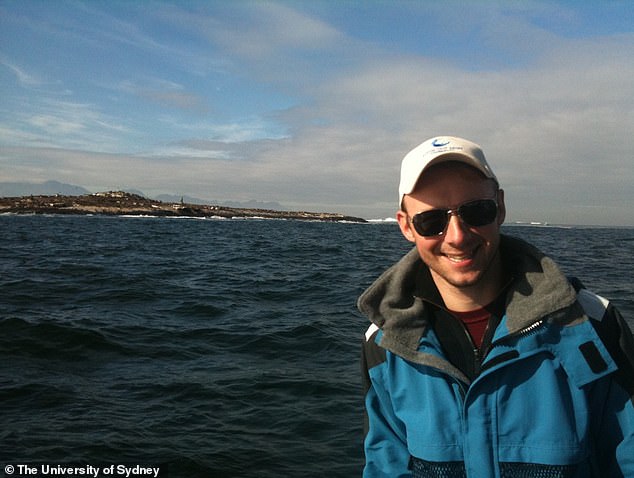Leading shark expert issues a dire warning that every Aussie swimmer needs to read – as he slams those calling it an ‘attack’
A leading expert has demanded the latest shark incident not be labeled an ‘attack’ – claiming shark nets make no difference.
Lauren O’Neill, 29, was rushed to hospital after she was bitten on the leg by a shark while swimming in Sydney Harbor near a private jetty in Elizabeth Bay on Monday evening.
She suffered significant blood loss and serious injuries, for which she will undergo surgery on Tuesday.
Experts believe Ms O’Neill was bitten by a bull shark after examining photographs of the bite, when harrowing new details emerged from eyewitnesses – including her leg ‘dragging behind her’ in the blood-stained water.
The life-threatening encounter has made Sydneysiders think twice before venturing into the city’s world-famous but shark-infested harbour.
Chris Pepin-Neff, a shark management expert from the University of Sydney, told Daily Mail Australia the incident could result in an increased risk of a ‘cluster’ of bites in the harbor as there are more warm days this summer are predicted.
Experts say Lauren O’Neill (pictured) is lucky to be alive after being bitten by a shark

University of Sydney shark management expert Chris Pepin-Neff has warned the incident could result in a ‘cluster’ of bites in Sydney Harbor
He also reiterated calls for the media to stop treating every incident as an ‘attack’.
Alternative recommended terms include “shark sightings” or “shark encounters,” “bites,” and “fatal shark bites.”
“Sharks do not deliberately attack people,” explained Dr. Pepin-Neff out.
‘Sharks will recognize humans as a ‘biological failure’ because we use more energy than we give, and are therefore not prey.
“The thing to remember is that you are in their way, not on the menu.
‘The media should also take into account that in Australia 40 percent of shark bites do not result in injury.
“A lot of them end up being small bites from small sharks.”
However, a different rule applies to Ms O’Neill when she shares her ordeal publicly.
“Individual people and their families involved in an incident can describe it in any way they want,” Dr. Pepin-Neff said.
He added that Ms O’Neill is very lucky to be alive after what he called “a very serious incident” given the significant amount of blood loss.
There are currently no shark nets or net enclosures in Elizabeth Bay Harbour.
However, the City of Sydney Council has explored the possibility of expanding grid locations along the harbour.

Lauren O’Neill will undergo surgery after being bitten by a shark in Elizabeth Bay
The nets currently installed at more than 50 beaches in New South Wales will remain in place until the end of April.
Dr. Pepin-Neff has previously investigated the use of lethal shark control measures, such as nets in NSW and drum lines in Queensland, both of which he described as nothing more than political opportunism.
He believes a shark net wouldn’t have made a difference Monday night, but has no problem with sustainable ocean fencing to protect the public.
“Shark nets are a way to politically defraud the public,” he said.
‘There is little evidence that nets work and protect swimmers.
‘But you can also have environmentally sustainable fences so that people can enjoy the harbor safely.’
Dr. Pepin-Neff reminded Sydneysiders that the harbor is home to bull sharks, which travel back and forth to the Brisbane River and harbor depending on the season and water surface temperature.
While other experts warn that sharks’ senses are heightened at night and early in the morning, Dr Pepin-Neff said shark bites also occur in the middle of the day when there are more people in the water, which affects the temperature.

Dr. Chris Pepin-Neff also reminded the media not to label every shark incident as an “attack.”
“Sydney Harbor is a wild, dynamic ecosystem,” said Dr. Pepin-Neff.
‘Currently more people are using the harbour, staying longer and going more often, so we need to pay more attention to these ocean dynamics from a swimmer safety perspective.
Shark ecologist Dr. Amy Smoothey was also quick to remind swimmers that summer and fall are the most active times for bull sharks.
“Bull sharks are a tropical and subtropical species that come along the NSW coast to our Sydney waters when water temperatures are warm,” she explained on Sunrise.
‘Bull sharks like warm water – 22 to 23 degrees is their preferred temperature – and we know this is currently the case in Sydney Harbor and off our coastal beaches.’
Although bull sharks have a bad reputation for being more aggressive, Dr Smoothey says their abilities allow them to exploit more environments.
